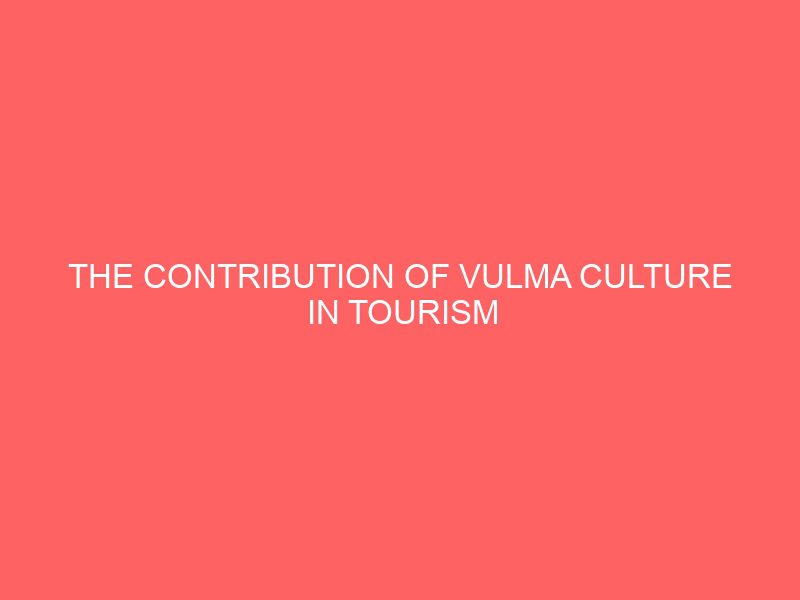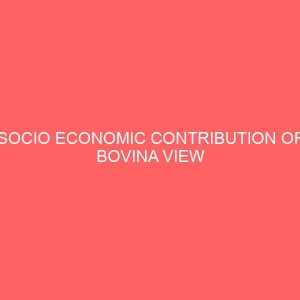Description
ABSTRACT
Our Common Future Report several years ago was emphatic that cultural activities constitute an integral part of human existence. And as man intensifies effort towards development defined as enhancement of his standard of living, culture cannot be relegated to the background in view of its role in fostering sustainable development. However, culturedriven development has never been seriously considered in several parts of Africa including Nigeria. And within the context of mans activities on the environment, much care is needed to strike a balance between meeting the needs of this generation without necessarily jeopardizing the opportunities of the future generation which sustainable development entails. Thus, the research highlights the imperative of integrating culture into efforts to promote development. The centrality of culture in the overall effort at ensuring development in Nigeria is emphasized. Furthermore, it laments the neglect of culture on the part of government in terms of funding, policy mechanism and emphasize the fact that conscious effort geared towards the promotion of culture remains the focal point of sustainable development in Nigeria. The research also highlights sundry hindrances and roadblocks to cultural development in Nigeria and proffer suggestions aimed at improving the prevailing dilemma. Historical descriptive approach was adopted as method of data collection in research on the research. The research findings of the research were collaborative of the fact that culture has direct bearing on development.
CHAPTER ONE
1.0Introduction
Agarwal 1997. Having unique indigenous cultures, naturebased attractions, beautiful landscapes, and pleasant weather conditions, local communities in Africa, and other Third World countries, are increasingly being promoted and marketed in major tourist generating countries, particularly in Europe and North America, as offering immense touristic and recreational opportunities. Particularly, indigenous communities in the Third World are perceived as providing abundant opportunities for rich tourists from the North who have got the financial resources to spend in adventure and exotic recreational activities. As a consequence, an increasing number of international tourists are travelling to different tourist destinations in Africa and other less developed regions of the world. In 2001 for instance, over 28 million international tourists, mainly from Europe and North America, travelled to different destinations in Africa. It is further estimated that with the current international growth rate of the tourism industry, over 77 million international tourists will visit Africa by the year 2020 WTO 2004.
Neoclassical economists and development experts contend that unlike factor driven technology based development, local communities in Africa and other parts of the Third World have a comparative advantage in the development of tourism and other nontechnology based economic sectors. The development of tourism amongst local communities is, therefore, perceived as fitting quite well with the natural process of development based on comparative advantage Brohman 1996. This argument is based on the premise that local communities, particularly in Africa, should mainly specialise in primary exports, including tourism, where they have comparative advantage rather than depending on technology based economic sectors that do not conform with the principles of comparative advantage in the global market demand.
Particularly, local communities in subSaharan Africa are usually perceived as having a comparative advantage in the development of tourism. This is due to the fact that they possess unique indigenous cultural and naturebased attractions that the Western tourists lack in their transformed and urbanised environments Butler and Hinch 1996; Cohen 1996. Many Western tourists are haggling for these forms of touristic attractions in order to escape from the perceived monotony of everyday life in the often overcrowded and congested urban conglomerates. In this regard, tourists want to travel to other places, albeit temporarily, in order to escape from the monotony of routine life and are, therefore, looking for alternative environments that are perceived as having fascinating indigenous cultures and pristine nature attractions Smith 1995; Sharpley 1999.
1.1Background of Study
Nigerian cultures are diverse in nature and like most other cultures in the world have been influenced by external factors within the context of globalization. In recent times, cultural regeneration has become a central theme in Nigeria among scholars, enlightened citizens and NonGovernmental Organizations NGOs with the understanding that to harness the cultural resources of Nigeria is the best bet to usher the country to the path of sustainable development. Therefore, the call to lay great emphasis for exploration into diverse cultural dimensions in Nigeria has become loud and resounding. In this paper a greater focus will be laid on cultural tourism which has not been really exploited fully. Cultural tourism if fully exploited will promote sustainable development and place Nigeria strategically in a position where exportation of culture to the global environment becomes a reality.
According to Sharpley:2003:p34 Community development in Nigeria eliminate suffering of like illiteracy, and sickness thus improving the standard of living of the people within the community for instance, the introduction of compulsory free education programme development project in Nigeria during Olusegun Obasanjos regime partially to eradicate suffering of illiteracy at the community level. It also Community development helps to improve the economic social and cultural conditions of communities, thus enabling members of community to contribute meaningfully to the achievement of national objectives. More to it Community development helps to eradicate or reduce abject poverty in Nigeria. The provision of social amenities like water, roads, electricity and hospitals, valued culture which are part of development in the community can lead to the reduction of abject poverty in the country. Because when hospitals are being built in a particular community, the members of the community and a valued culture celebrated citizen will travel to witness the event and there by bringing development and high standard of living of the people. It also serves as a means of providing social amenities like roads, water, bridge and social amenities.
Ife and Fiske 2006 developed a model to illustrate the dimensions of service provision understood from a Community Development perspective, which incorporates Perkins emphasis on indigenous leadership and the historically colonial connotations of some Community Development efforts. And according to Okiy community development is a basis for economic development and information is an important ingredient in development process. People of the community whether literate or not should have access to any kind of information which will help them to become capable and productive in their social and political obligation, to become better informed citizens generally. Okiy 2003,1.
On the other hand, when the communities is not developed, there will be vices that pulls a society down. As Yahya opined: Lack of development has a positive correlation with the neglect of rural areas. Rural neglect brings negative consequences such as exodus of rural dwellers to urban areas, with resulting problems of unemployment, crime, prostitution, child labour, insecurity, money laundering, bribery, poverty proliferation of shanty living areas, spread of diseases and overstretching of the facilities and infrastructure in the urban areas. Yahya 2009.
From the review of the development within the community and its trend by previous research work, the researcher can conclude or say that the contribution of culture to development is the grass root to development and sustainability to the community, through which community growth commence. As stated by Okiy 2013 that lack of community development brings about vice and disorder in the community, the researcher sees a need to drive development to undeveloped community by uplifting the community culture and values among the nation in order to avoid all these vices.
Cultural tourism is therefore a kind of travel to experience and in some cases participate in a vanishing, eating in rustic shades with calabash, festivals like Vulma culture of Mubi South Local Government Area. Culture tends to standout in Nigeria tourism sector as Nigeria houses about 375 ethnic groups and each of these ethnic group has her own cultural heritage which describe the total way of life of the particular group. Before the coming of the Western culture, importance was attached to the participation in any cultural festival like Vulma culture Dragon festival. In those days, the Vulma culture has become a national religious institution and its anniversaries are celebrated with grand festivities. The mysteries connected with it are held sacred and inviolable.
Nowadays, these beliefs have changed, people have not been participating in Vulma cultural Festival especially and this is due to some factors that are connected with the coming of the Western culture and the various religious beliefs. But notwithstanding, its contribution to the development of the state Adamawa is significance, people from far and near come to Mubi of Adamawa State for tourism as a result of that culture. Sustainable tourism is development of tourism in a manner which is nondamaging to the environment and which contribute to social and economic benefits of the host community observed by Cliff Moughtin 1996 in urban design.
1.2Statement of Research
Several problems of the world are environmentally, economically, socially and culturally related. Tourism has stimulated the development of a variety of allied infrastructures and facilities. Tourism researchers Bachmann 1988; Debbage 1990; Agarwal 1997 contend that in most instances, local communities in Third World countries, particularly in Africa, are not appropriately represented in the planning, design, development and management of their respective indigenous cultural and nature based resources for tourism. As a consequence, members of respective indigenous communities are usually not appropriately represented in the commodification process in which local cultural or nature based resources are transformed into tourism products to be presented and sold to tourists. Thus, there are a number of critical issues as concerns the development of tourism in most developing countries, particularly in Africa, which call into question the efficacy of tourism as a tool for development. These issues include foreign domination and dependency, inequitable distribution and development, cultural and environmental degradation, and loss of control and cultural identity, as well as the overarching role of the state in the control and management of tourism resources Bachmann 1988; Sinclair 1990; Sindiga 2000; Akama 2004.
Therefore, the researcher has this research work to identify the contribution of Vulma culture to the development of tourism in Adamawa State, and thereby seek to carry out this research so as to highlight cultural tourism and its efficiency in development.
1.3Aim and Objectives of the Study
The aim of this study is to investigate the significance of Vulma culture in tourism development to Adamawa State.
The specific objectives are to:
Identify the importance of Vulma culture as a culture.
Employment opportunity brought by the cuture to Adamawa State in relation to tourism development.
And then how of greatly enhance tourism development in hospitality industry
To determine in what ways, Vulma culture could redeem the state image in order to attract an increased tourist arrival rate.
1.4Research Question
What is the level of significance of Vulma culture to the development of tourism in Adamawa State
Is Vulma culture been of positive contribution to the tourism development and hospitality industry in Adamawa State
Is there any employment opportunity relate with Vulma culture Adamawa State
In what ways has Vulma culture affected or impacted the tourism development in Adamawa State
1.5Research Hypothesis
Two important hypothesis was formulated and will be tested in this study, which will be accepted or rejected, if there is no significant difference in it Hnull Halt.
H0. Vulma culture has negatively affected Tourism development of Adamawa state.
H1. Vulma culture has positively affected Tourism development of Adamawa state.
H0. Vulma culture cannot facilitate tourists coming to Mubi
H1. Vulma culture can facilitate tourists coming to Mubi
H0. Vulma culture is not a factor of sustainable tourism development in Mubi off Adamawa State.
H1. Vulma culture is a factor of sustainable tourism development in Mubi off Adamawa State.
H0there is no significance relationship between Vulma culture to Tourism development.
H0there is a significance relationship between Vulma culture to Tourism development.
1.6Significance of the Study
This research report provides an extensive analysis and evaluation related to the Vulma culture in relation to tourism development.
This study is significant for the following reasons:
The study is an attempt to explore deeply and make a thorough research into the significance of Vulma culture to tourism development in Adamawa State, Nigeria
The write up is aimed to serve as a consulting material for scholars who may wish to know more on culture and its contribution to tourism.
The study will also analyze the prospects, problems and proffer solutions to the problems confronting Vulma culture in relation to tourism development.
1.7Justification of the Study
I want to justify this research work based on the objectives and the significance of this research work, what is within its coverage, this research work is with no doubt necessary to be carried out. Because if done will greatly highlight the importance of sustaining our cultural which will promote tourism development within the state.
1.8Scope of the Study
As important as one may intend to consider this study in the field, it would be in complete, if clarity is not made as to the scope of the study. The study is on culture and its significance contribution to the environment, the case study is just a reference point in the study which is Mubi South Local Government of Adamaa State as used. This research work will be compiled using 187 research respondents.
1.9Conceptual framework
In a careful study and research on this topic, the research designed a conceptual framework for this study, using real life situation to map out the study.
Source: researcher, 2016
Bello 2003:14 observed that government of Nigeria have become involved in tourism due to its sociocultural importance. The sociocultural effects of tourism can be profound, especially in developing countries like Nigeria where local communities can be transformed for good. Living standard of people and the quality of life can be realised by the inflow of finance, employment, and education opportunities, revitalisation of local traditions and culture. Tourism can be a source of peace and international understanding between different people by bringing them more closely together, economically, socially and building up friendships Okoli, 201: 30 through mutual understanding of each others culture.1.10Definition of Term
Culture: Culture is the characteristics and knowledge of a particular group of people, defined by everything from language, religion, cuisine, social habits, music and arts.
Community: a social group of any size whose members reside in a specific locality, share government, and often have a common cultural and historical heritage
Cultural tourism or culture tourism is the subset of tourism concerned with a country or regions culture, specifically the lifestyle of the people in those geographical areas, the history of those people, their art, architecture, religions, and other elements that helped shape their way of life
Tourism is travel for pleasure; also the theory and practice of touring, the business of attracting, accommodating, and entertaining tourists, and the business
Development: an event constituting a new stage in a changing situationNTDC: Nigeria Tourism Development Corporation.








Reviews
There are no reviews yet.